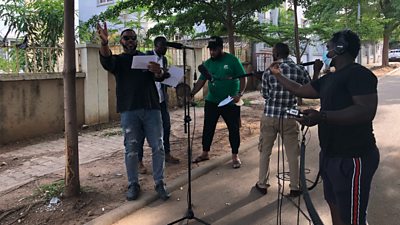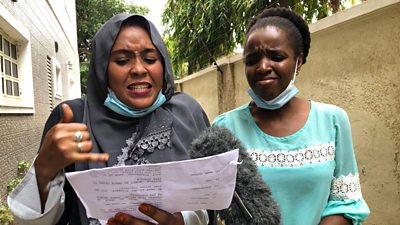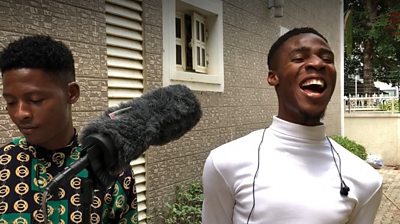Set in a traditional West African market, Story Story – Voices from the Market is back – with new episodes exploring and challenging negative stereotypes and myths around disability and neurodiversity. It's aiming to encourage more inclusive attitudes towards access to education and employment for people with disabilities.
When Story Story last aired, it was broadcast across 111 local partner stations and on �鶹�� World Service in Africa, reaching an estimated 20 million people. It returned to the airwaves in autumn 2020 after a three-year hiatus, and to �鶹�� World Service in summer 2021, to reach a new set of audiences.
The new series is part of the development consortium, which includes �鶹�� Media Action and is led by Sightsavers.
There are an estimated one billion people living with disability in the world; 80% of them live in low and middle income countries. In many parts of the world, people living with disability report frequent harassment and discrimination, and struggle to access education, health care and employment.
Initiatives such as Story Story aim to raise awareness and understanding of the issues people with disabilities face, in a way audiences can relate to. The new series tackles a wide range of issues including relationships and sexuality.
Rasak Adekoya, Inclusive Futures lead for Sightsavers in Nigeria, said:
“I think the media has a lot of role to play in dispelling the myths around disability inclusion, in terms of the language, in changing to use the right words and language.”
One of the stars of the programme is Emmanuel ‘E. Daniels’ Buzabeye, a Nigerian musician and producer with a visual impairment, who plays a shop assistant learning to change his perceptions of people with disabilities, and challenging others across the continent to do the same.
E. Daniels said:
“What impresses me about Story Story is the scripting. Being able to put together this thing, in very plain terms, so that every kind of person listening to it will understand and get the message clear.
"Giving me the character of Bulous, and then noticing this character was not a character with a disability was exciting for me....It’s not because you have a disability that you should come and act this.”

Our initial results show that the programme is already having an impact.
Recent research, based on a household survey of more than 5,600 respondents conducted in the project’s five focal states in July and August 2021,shows that over a quarter (28%) of listeners say they have done something differently as a result, including treating people with disabilities more kindly (81%), being more friendly with people with disabilities (69%) and no longer discriminating against people with disabilities (60%). Almost half (47%) of listeners have discussed what they learned with family or friends.
Research has shown that people who are most engaged with the drama have more positive perceptions of disability and people with disabilities, compared to those who do not listen. This is true even when controlling for factors such as higher education levels and previous contact with people with disabilities.
The impact is in part because Story Story is produced by a new, fully disability-inclusive writing team, who underwent disability-inclusion training before creating new characters and storylines representing a wide range of abilities.
Story Story writer Sonia Nwosu said:
“The first thing we did, apart from knowing the characters and their world, you have to know the disability issues that there are, and really what are the gaps in society that need to be filled. It wasn’t until then that we were able to understand that it isn’t people with disabilities adapting to the community, but the society that would become more inclusive.
“We need to adjust our thinking, we need to adjust how we are, to be more inclusive and more accepting.”
Story Story is now airing on �鶹�� World Service in Africa and is available on �鶹�� Sounds, with 48 new episodes on the �鶹�� and 52 for local Nigerian stations.
We're also proud that Story Story was featured on the �鶹�� World Service's Fifth Floor, available here on �鶹�� Sounds (starts from 13.17).

--
is a consortium of 16 international organisations, led by Sightsavers and funded by UK Aid. It works with the public and private sectors, people living with disability and organisations that represent them, to work toward equal opportunity and full inclusion in society, particularly in education, health and employment.
